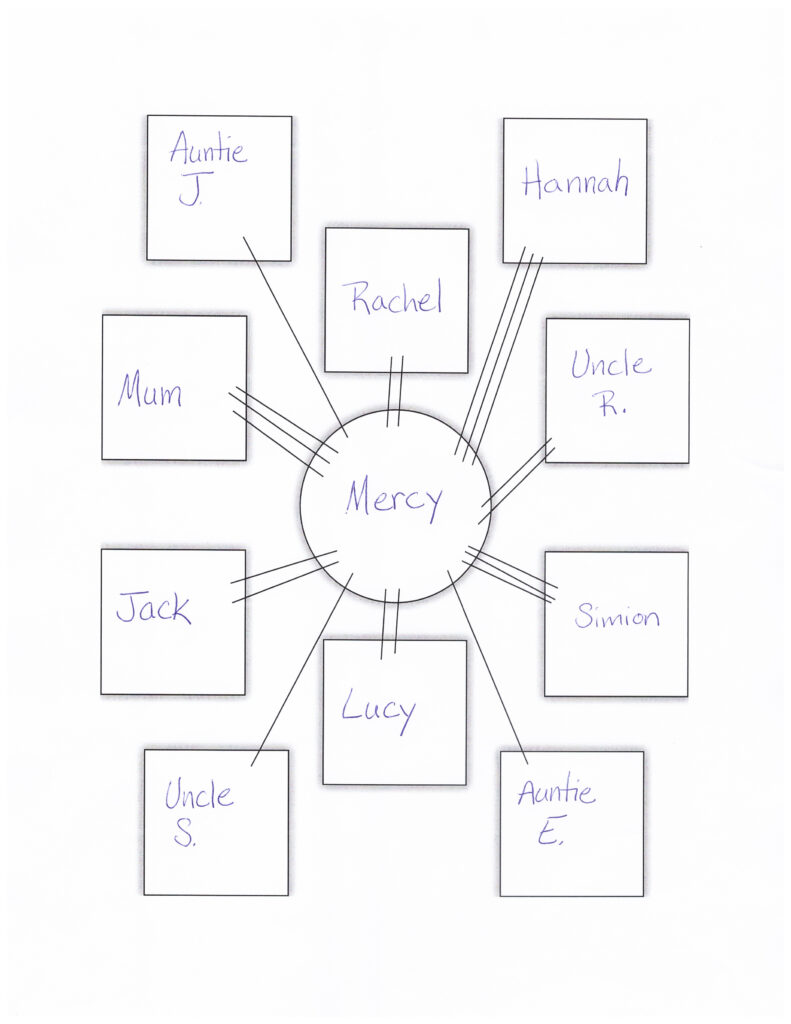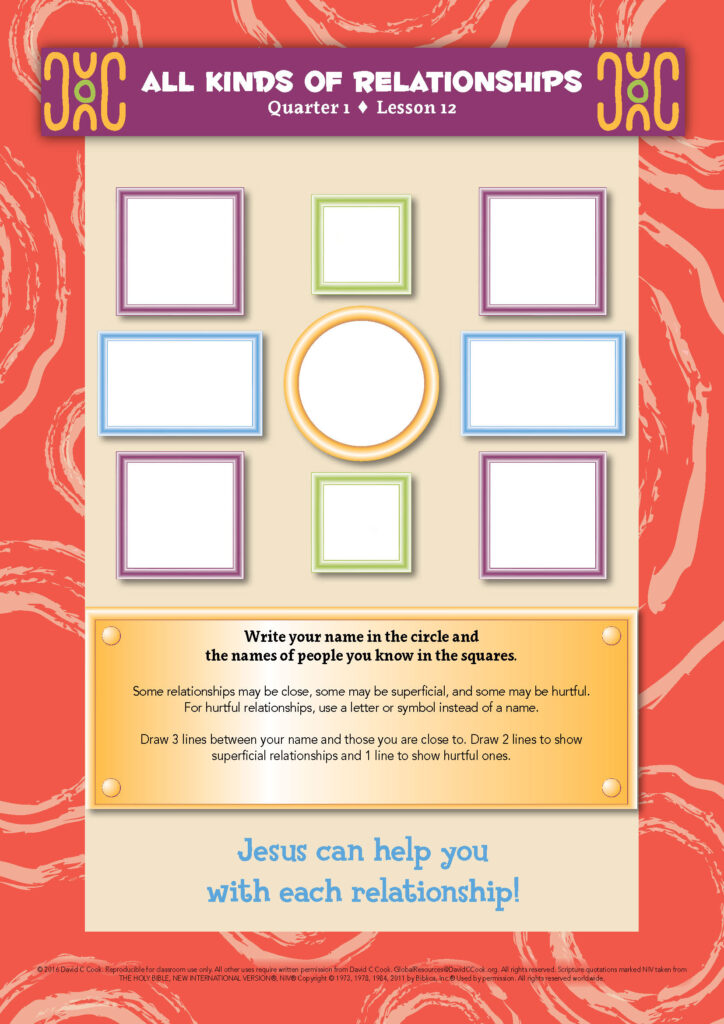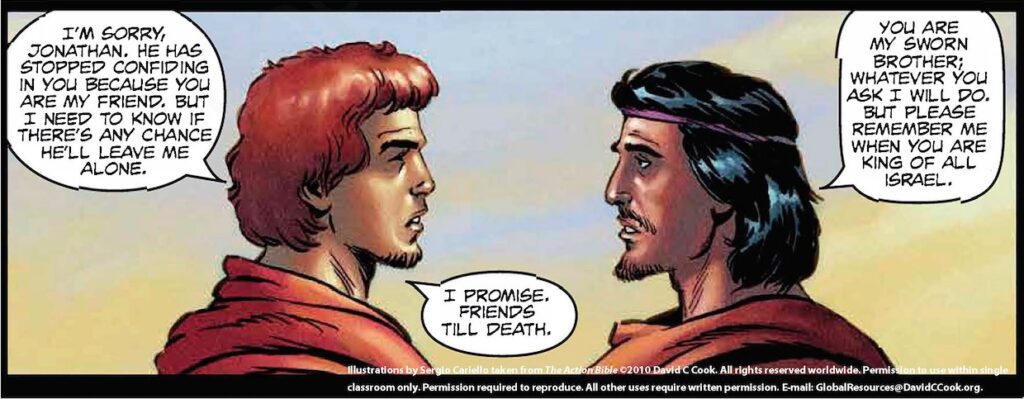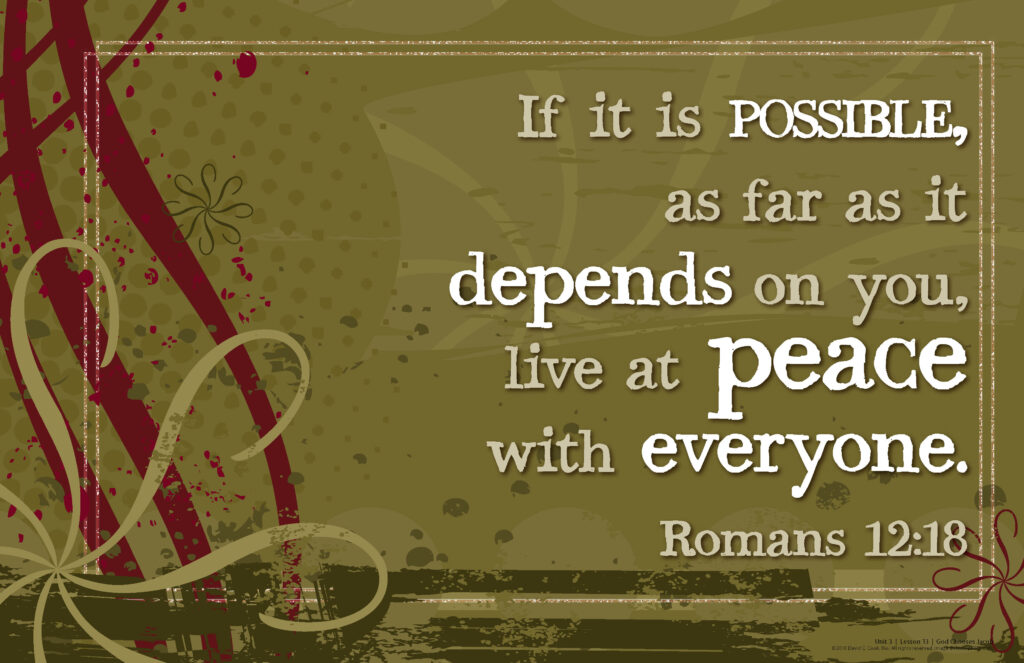During the lesson, the information for you to know is written in regular type, and what we suggest speaking or reading aloud to children is in bold. All resources for this lesson, including the Teacher Guide, Student Page, Family Connection Card, and other resources can be downloaded in a ZIP file by clicking on the following link:
In some lessons you will find "resource articles." These are articles written by experts from around the world to help equip you for your work with children and adolescents. Share them with parents or guardians if you consider it appropriate.
If it is possible, as far as it depends on you, live at peace with everyone.
Romans 12:18
The woman down the road who is friendly but emotionally distant. The precious gift of a loving friend who is always supportive. The person in your life who continues to hurt you through words or actions any time you are around him. How do you live at peace with all these different types of relationships? Is it even possible?
Our wonderful and great God created us for relationship. He is the One who said that as much as possible we should live at peace with everyone. Sometimes, though, as much as you try, that difficult person in your life will not be kind, and you end up feeling like you are not living in peace. But note that the verse above says, “as far as it depends on you.” Do all that you can to live at peace. However, when you are in those relationships that are like a sharp pebble in your shoe—always poking you wherever you go—trust God to give you guidance and help. He is with you. Pray for that difficult relationship now.
Let the families of your students know that you are talking more about different types of relationships and living at peace with everyone as much as possible. This could be something that positively impacts the family as they learn to live more at peace with each other too!
Teacher Tip: If possible, email or text the Family Connection Card to the families of your students.
Welcome your children warmly. Ask them if they had opportunities to work on mending broken relationships. Ask 1–2 children to share their experience from this past week. Encourage all the children to continue to practice ways to mend broken relationships.
Have the children sit in a circle. Explain that today you will talk about the different relationships in your lives. Some relationships will be close and loving. Others will be superficial. Still others may be hurtful.
Think about the different relationships in your lives. We all have different levels of relationships with family, friends, schoolmates, neighbours, and people we see on a regular basis. You have some close, loving relationships with some people.
Others relationships may be superficial. A superficial relationship is one where you do not know someone very well—for example, the woman who sells eggs. You may know her face but not her name or anything else about her.
The last type of relationship I want you to think about are hurtful relationships. These may include a family member, neighbour, teacher, friend, or other person who has hurt you deeply physically, emotionally, or verbally.
Ask the children to close their eyes and silently follow the instructions you give.
Think of someone with whom you have a close and loving relationship. For each close relationship you think of, raise both hands with fingers outstretched. Do this for as many people you can think of with whom you have a close relationship. If you have more than 10, praise God and only raise your hands 10 times.
Think of someone with whom you have a superficial relationship. Raise one hand with fingers outstretched for each superficial relationship. Do this for as many people you can think of with whom you have a superficial relationship. If you have more than 10, praise God and only raise your hands 10 times.
Think of someone with whom you have a hurtful relationship. Raise your hand, clenched in a fist, to show that relationship. Do this for as many people you can think of with whom you have a hurtful relationship. If you have more than 10, ask God to help you.
As the children raise their hands to indicate the types of relationships they have, pay special attention to those children who indicate they have many hurtful relationships or very few close relationships.
Optional Supplies:
Rather than rating relationships with hand gestures, give your children paper and pencils. Show your children the illustration and ask them to quickly draw it on their papers.

If you are using Student Pages, have the children do this activity on those rather than drawing it on paper.

The children will put their names in the centre of the map or drawing. In the squares around their names, the children will write the names of people who are in their lives: close, superficial, or hurtful relationships. Names may include father, mother, brother, sister, neighbour, relative, aunt, uncle, teacher, friend, etc. Some will be people with whom they have close, loving relationships. Others will be people with whom they have superficial relationships. If the children do not want to put names of people in the squares, suggest they pick a symbol, such as an arrow pointing down, to represent these people.
Ask the children to draw lines between their name in the centre and the other squares according to how close they are to that person. They will draw 3 lines from their name to the names of their close, loving relationships. They will draw 2 lines for superficial relationships. They will draw 1 line to represent a hurtful relationship. Not everyone will have all 3 kinds of lines. Some will have all 2-line relationships. Some will have more 1-line relationships than 3-line relationships.
Look over the drawings, paying special attention to those children who have a lot of 1-line relationships. They are telling you that they consider many of their relationships to be hurtful.
End of Option
Divide the children into groups of 3. Each group will discuss the following statements and questions. Give each group 1 or 2 minutes to discuss each one.
All through the Bible, we learn about relationships. God created people to have friendship with Him. I will tell you a story about King David. This story happened before he was king.
As a young man David had killed the giant Goliath. King Saul was so impressed with David that he had asked David to enter his service. King Saul’s son Jonathan became best friends with David. Listen to what the Bible says about their friendship.
Jonathan made a covenant with David because he loved him as himself. Jonathan took off the robe he was wearing and gave it to David, along with his tunic, and even his sword, his bow and his belt.
1 Samuel 18:3–4

A covenant is a promise. Jonathan loved David as much as he loved himself. Jonathan was the son of the king, so he was in line to become the next king. When he gave his robe and other items to David, he was saying that his love for David was more important than even being in line to be king someday.
King Saul made David a commander in the army. David continued to win many battles, and everyone admired him. However, the more people admired David, the more King Saul became jealous of him. David’s relationship with Saul turned into a hurtful one. After a time King Saul even tried to kill David. How sad that this relationship became hurtful.
That can sometimes happen in our relationships too. Relationships that have been close grow more distant or superficial. Sometimes they can even turn hurtful like King Saul’s and David’s relationship did.
But God wants us to love our friends like Jonathan loved David. The idea of loving someone like you love yourself is God’s idea! Listen to what Jesus says about how to have good relationships:
“Love the Lord your God with all your heart and with all your soul and with all your mind.” This is the first and greatest commandment. And the second is like it: “Love your neighbor as yourself.”
Matthew 22:37–39
When we live by this one rule, “Love your neighbour as yourself,” everything else works well. Our lives will be pleasing to God. If we love others, we will treat everyone the way God wants us to love them. We will please God.
Allow children to answer and then add the following information if they do not mention it: It means I care for the person, look out for him or her, do what is best for that person, etc.
Place the children into groups of 3 again. Ask the children to number themselves 1, 2, or 3. You will read the following role-plays. Each one will give the children practice in how to get along with people in their circle of relationships. The children should respond how they think the people in the role-plays would. If you have time, after each role-play, allow one group to act it out for everyone.
Situation 1
Persons 2 and 3 do not like each other. They have a hurtful relationship. Begin with 2 and 3 having an argument. Person 1, try to convince them to get along. Talk to each other how people really would.
Give the children about 5 minutes to act out the role-play. After time is up, ask 1–2 children to share what they learned.
Situation 2
Person 1 has taken a notebook that belonged to person 3 and destroyed it. Person 3 is angry and also very sad. The notebook had a lot of school notes in it, and now it is gone. Person 2 enters the conversation and tries to help person 1 see how wrong he was. Person 2 also tries to help person 3 with her sadness and sense of loss.
Give about 5 minutes for the role-play. After time is up, ask 1–2 children to share what they learned.
In life we will always have friends, acquaintances, and maybe even a few people with whom we have hurtful relationships. God wants to help us live at peace with all three as much as possible. Listen to this verse:
If it is possible, as far as it depends on you, live at peace with everyone.
Romans 12:18
Show the optional Memory Verse poster if you are using it. Read the verse aloud again.

Friends and family with whom we have close, loving relationships are easy to live with in peace. They already like us. They add goodness to our lives and make us happy. They may pray for us, give us good advice, and help us follow Jesus.
Acquaintances are important, even though they are superficial. We may only have one or two really good friends, but we can have 20 or more acquaintances in our lives. These people can teach us valuable lessons in life. It may or may not be as easy to live in peace with them.
The people who are the hardest to live in peace with are those who hurt us. They give us an opportunity to try to live for Jesus, even when it is not easy. As the Bible verse says, we should try to live at peace with them, as far as it depends on us. We can learn from these people what not to do in life!
Close class by asking the children to show 1, 2 or 3 fingers, as you pray.
Dear Father God,
One finger! Help each of us to live at peace with others, even when those around us may be unfriendly and hurtful.
Two fingers! May each of us have lots of good acquaintances who love You. What a great opportunity to see how people we do not know very well live and love You.
Three fingers! We thank You, Heavenly Father, for the close and loving friends and family in our lives. May every child here always have at least one special person who cares about her in a very special way!
We love You. Thank You for showing us what good relationships look like. In Jesus’ name, amen.
Close class by praying this blessing over your children.
Blessing: May your Father God bless you and give you strength to live at peace with everyone.
Continue to share this song with your children to celebrate how great God is in giving friendships!
Life on Life ©2020 David C Cook. Reproducible for home or classroom use only. All other uses require written permission from David C Cook [email protected]. All rights reserved.